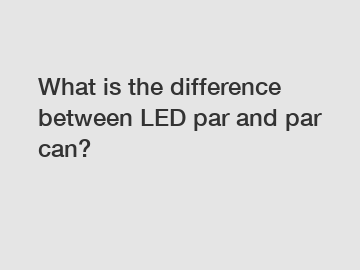Feb. 21, 2024
Electronic Components & Supplies
Lucky supply professional and honest service.
LED par and par can lights are two popular choices for stage lighting and events. While they may seem similar at first glance, there are key differences between the two that can impact their performance and usability. Understanding these differences can help you make an informed decision when choosing lighting for your next event or production.
LED Par Lights.

LED par lights are a type of stage lighting fixture that uses light-emitting diodes (LEDs) as the light source. LED par lights are known for their energy efficiency, durability, and versatility. They come in a variety of sizes, shapes, and colors, making them suitable for a wide range of applications. LED par lights are often used for stage lighting, accent lighting, and architectural lighting.
One of the main advantages of LED par lights is their energy efficiency. LED lights consume less power compared to traditional lighting fixtures, which can lead to significant cost savings over time. LED par lights also have a longer lifespan than traditional lighting fixtures, reducing maintenance and replacement costs. Additionally, LED par lights generate less heat, making them safer to use and more comfortable for performers and audience members.
Par Can Lights.
Par can lights, also known as par cans or par lanterns, are a type of stage lighting fixture that uses a halogen lamp as the light source. Par can lights are versatile and easy to use, making them a popular choice for stage lighting and events. Par can lights typically come in metal or aluminum housing with a reflector and lens to control the beam of light. Par can lights are available in a variety of sizes, wattages, and beam angles to suit different lighting needs.
One of the key differences between LED par lights and par can lights is the type of light source used. LED par lights use energy-efficient LEDs, while par can lights use halogen lamps. Halogen lamps produce a warm, yellowish light that is often preferred for certain applications, such as theatrical lighting. However, halogen lamps are less energy-efficient and have a shorter lifespan compared to LEDs.
Another difference between LED par lights and par can lights is the color options available. LED par lights can produce a wide range of colors using RGB (Red, Green, Blue) LEDs, allowing for greater flexibility and creativity in lighting design. On the other hand, par can lights are limited to the color of the halogen lamp used, typically warm white or amber.
Choosing the Right Lighting Fixture.
When deciding between LED par lights and par can lights, it is important to consider your specific lighting needs and preferences. LED par lights are ideal for those looking for energy-efficient, versatile lighting with a wide range of color options. On the other hand, par can lights are suitable for applications where a warm, yellowish light is preferred and color options are less critical.
Ultimately, the choice between LED par lights and par can lights will depend on factors such as budget, lighting requirements, and personal preferences. Both types of lighting fixtures have their own advantages and limitations, so it is essential to weigh your options carefully before making a decision.
In conclusion, LED par lights and par can lights are both popular choices for stage lighting and events, each with its own unique features and benefits. Understanding the differences between the two can help you choose the right lighting fixture for your next event or production.
Contact us for more information on LED par lights and par can lights, or to find the perfect lighting solution for your event.
Want more information on LED Screen Manufacturer? Feel free to contact us.
If you are interested in sending in a Guest Blogger Submission,welcome to write for us!
All Comments ( 0 )